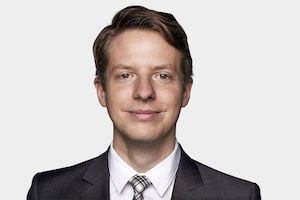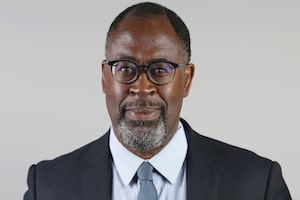Police officers take part in an operation on March 14 in the surroundings of the National Penitentiary in Port-au-Prince, Haiti.Ralph Tedy Erol/Reuters
Canada has partly evacuated its embassy in Haiti by helicopter because of the continuing takeover of Port-au-Prince by armed gangs and mounting uncertainty over plans for an international security force.
Canadian officials chartered a chopper to ferry diplomats from the compound in the Haitian capital to the Dominican Republic on Thursday morning, Global Affairs Canada said. Some essential staff, including ambassador André-Francois Giroux, will remain in Haiti while others will work from Santo Domingo.
For the past two weeks, gangsters have seized government buildings, blockaded Port-au-Prince’s port and airport, stormed prisons to free the inmates and fought gun battles with police in the streets. In the latest violence Thursday, they set fire to both a prison and the home of the police chief.
Canada, the United States and Caribbean countries earlier this week tried to broker a solution to the crisis that would have Haiti’s unelected leader, Prime Minister Ariel Henry, cede power to an interim government ahead of a Kenya-led security force arriving to restore order. But it remains unclear when or if either will happen.
Meanwhile, supplies of food, medicine and gasoline are dwindling as the gangs have taken a stranglehold on all air, land and sea routes in and out of the capital.
“It’s total chaos. It’s a total breakdown. We’re locked inside Port-au-Prince. The entire city centre has been captured by gangs. We are encircled by gangs,” Mathias Pierre, a former Haitian cabinet minister, said in an interview from the capital. “The hospital can’t function and, maybe, in a few days, there will be no gas, no food. People are struggling.”
Concern over supplies running low prompted the decision to pull some Canadian embassy staff out, officials said in a briefing in Ottawa. The operation also brought in additional security officers. The officials would not say how many diplomats exactly were taken out of Port-au-Prince and how many will remain.
“This adjustment will allow us, first off, to ensure a certain, lasting and operational Canadian presence,” Sébastien Beaulieu, director-general of security and emergency management at Global Affairs Canada, told reporters. Mr. Beaulieu said 3,000 Canadians in Haiti are registered with the embassy. There are no plans for repatriation flights or assisted departures.
Konrad Yakabuski: Haiti cannot wait another year for the U.S. and Canada to help
Canada’s operation on Thursday did not involve the use of troops, said Isabella Orozco-Madison, a spokesperson for Foreign Affairs Minister Mélanie Joly, unlike the U.S., which dispatched Marines to secure its embassy in Haiti this week.
David Rocheleau and Richard Phillips, two Canadians working with a non-profit in Haiti who got stuck when the airports shut down, said they registered with Global Affairs but have not gotten any assistance other than messages telling them to shelter in place.
“Would have thought they would say more, but it’s really hard to guess what will happen yet,” Mr. Phillips told The Globe and Mail by text message.
Haiti’s gang problem has steadily escalated under the rule of Mr. Henry, who took power in 2021 after the assassination of the country’s last elected president, Jovenel Moïse. Mr. Henry has repeatedly delayed elections as he sought foreign military intervention. While he was in Kenya last month, the gangs launched the attacks that put them in control of the capital.
Gang leader Jimmy (Barbecue) Chérizier demanded Mr. Henry’s resignation. The Prime Minister, unable to return to Haiti and refused entry to the Dominican Republic, has holed up in Puerto Rico.
The U.S. and other foreign countries, which previously backed Mr. Henry’s government, put pressure on him to resign. At an emergency meeting of the Caribbean Community (or CARICOM), and U.S. and Canadian officials, in Jamaica this week, they crafted a plan for a Presidential Transition Council. Mr. Henry has acquiesced, saying he will step down once the council is formed.
When or whether this will take place is up in the air. Some Haitians are skeptical the council, to be made up of representatives of rival political parties – some of which have been accused of gang ties themselves – will be able to work together to restore democracy.
Chantal Merzier-Elie, a former policy adviser to the Haitian government, said Haiti should instead follow the process laid out in its constitution for a presidential vacancy. In that case, the head of the country’s Supreme Court would take over and organize elections within three months.
And instead of pushing for an international security force, she said, Canada and the U.S. should work to break the connections between political groups and armed gangs. “They should help the national police arrest these people and keep them somewhere where they cannot escape,” she said.
Haiti’s top gang leader threatens politicians as fires break out in capital
Explainer: What’s going on in Haiti? Latest news from a Caribbean nation in crisis
The international security stabilization force is also stalled.
Kenyan President William Ruto has pledged that his country will lead the multinational mission and provide 1,000 of the up to 5,000 police officers it will entail. He has faced fierce domestic opposition, however, including a court challenge that delayed deployment. He said this week that he is waiting for the transition council to be in place before moving forward. Mr. Ruto is also insisting on guarantees of funding for the full US$600-million price for the mission.
Both Prime Minister Justin Trudeau and U.S. Secretary of State Antony Blinken called Mr. Ruto to push for action. The U.S. has pledged US$300-million and Canada is kicking in $80.5-million. “The leaders underlined the need for additional international partners to step up and provide much-needed support,” Mr. Trudeau’s office said in a summary of his call with Mr. Ruto.
Speaking with reporters Thursday, the White House’s National Security Council spokesperson John Kirby acknowledged the difficulty in getting the force going. “We have a lot more work to do to get this Multinational Security Support Mission up and running and on the ground to assist the Haitian National Police.”
Such international intervention is also causing worry in Haiti, which has a horrific history with previous foreign forces. During a United Nations peacekeeping program between 2004 and 2017, troops caused a cholera epidemic and ran a child molestation ring.
Monique Clesca, a Haitian human-rights activist and former UN official living in Port-au-Prince, said authorities under both Mr. Henry and Mr. Moïse did not sufficiently address gang-related violence before asking for international help. “There was no political will to resolve the problem,” she said.
Ms. Clesca said foreign countries could help address the root causes of violence, such as by providing opportunities to impoverished youth, but she is opposed to the international security force. “I never thought having that kind of mission was good.”
Politics, business and gangs have long been intertwined in Haiti, said Michael Deibert, a Haiti researcher for the Center for International Studies at the University of Lisbon. Since the 1990s, it has been common for political and corporate leaders to work with armed street groups to buttress their own power.
“What you saw over the last two weeks is the gang state that has been fostered and brought along by various Haitian politicians and business figures reaching an equilibrium with the official state,” Mr. Deibert said, “and surpassing it.”
People lined up in front of a bank in Port-au-Prince as some businesses reopened during a break from gang violence in the Haitian capital. Public transportation has also resumed and more Haitians could be seen on the streets almost 10 days after gang attacks brought the city to a standstill.
The Associated Press
 Adrian Morrow
Adrian Morrow Ian Bailey
Ian Bailey Geoffrey York
Geoffrey York